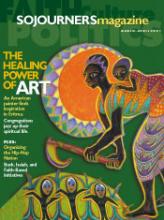While on a recent sabbatical in Israel, I interviewed a Palestinian Muslim woman about her recollections of family history, their struggles during the last 50 years, and how that shapes her view of the situation in Israel and Palestine today. She spoke with surprising equanimity about having to flee Jerusalem with her family to her uncle's home in Damascus during the 1948 war, fully expecting to return within a couple of weeks. She still recalls her father telling her mother not to pack too many things for they would be gone only a short time. Two years later they were able finally to return to Jerusalem, only to move into a very modest, rundown home. At that point, she said, "We knew we were refugees."
It was when she began to speak to me about the house that she and her family fled more than 50 years ago-to which she still has the key-that she became animated and impassioned. For her, this symbolizes the injustice that has been done to her and her people. So powerful is this image that she recently hired a film company to make a film of the house-still standing and occupied by Israeli immigrants-to send to other family members, presumably to keep the memory of this deeply felt injustice alive. To forget the house is to forget the injustice, and the memory of that injustice informs her sense of identity and solidarity as a Palestinian.
The inability to remember seems self-evidently problematic to us. Without a sense of history and culture, a society cannot long maintain a sense of identity. Not to remember the injustices of the past seems like a betrayal of one's ancestors, perhaps even of the principles that ought to underwrite fairness and justice.
Read the Full Article
